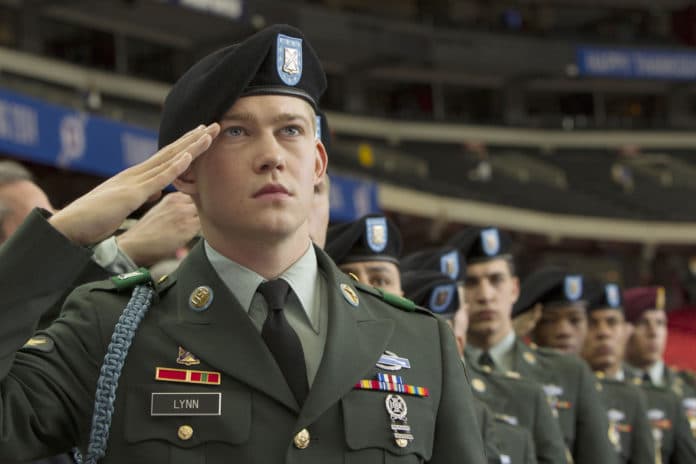The big news about “Billy Lynn’s Long Halftime Walk” is the cutting-edge technology that was used to make it. Director Ang Lee shot the movie – the first of its kind – at 120 frames-per-second in ultrahigh definition 3-D.
Translation: It’s supposed to look more real than anything we’ve seen before. The drama about an Iraq War hero on a victory tour of the heartland is meant to be an immersive experience.
There’s just one problem: Lee’s technical experimentation doesn’t enhance the moving story so much as distract from it, with maddening consistency.
For better or worse, few theaters are capable of showing the movie as it’s meant to be seen, so only certain New York and Los Angeles filmgoers will get the full treatment. But even watching it in the traditional 2-D, 24 fps format is enough to expose the director’s all-too-apparent efforts to draw the viewer in.
Screenwriter Jean-Christophe Castelli adapted novelist Ben Fountain’s 2012 bestseller about Billy Lynn, a 19-year-old soldier thrust into the limelight after a viral video shows him taking out some Iraqi fighters while trying to save his commander. As a result, Billy and his unit, known as the Bravos, take a break from fighting to tour America, culminating in an appearance alongside Destiny’s Child in an NFL halftime show on Thanksgiving Day, 2004.
The movie unfolds over the course of that day, when the sensory overload of a raucous stadium turns Billy (Joe Alwyn, in a phenomenal debut) introspective, leaving him to contemplate some not-so-distant memories. One moment he’s getting ribbed by his bawdy brothers-in-arms in a limo on the way to the game, and the next he’s transported back to his childhood home in small-town Texas, where his sister (Kristen Stewart) tries to convince him to leave the military, via medical discharge for post-traumatic stress disorder.
Tonally, the movie is continually shifting, and it’s a credit to Lee that the whole thing doesn’t give the viewer emotional whiplash. There are so many things that trigger Billy’s memories that it makes sense, even during the over-the-top stadium festivities, that his war experiences would never be far off. Before the show, Billy strikes up a conversation with a pretty cheerleader (Makenzie Leigh), but the flirtation can’t distract him for long from the moment that made him famous: the day he held his sergeant, known as Shroom (Vin Diesel), while the man bled out on the battlefield.
The movie deals sensitively with some hot-button issues, whether it’s PTSD or the fact that these young men are stuck fighting a war they don’t believe in, courtesy of powerful decision-makers back home. Billy also struggles with his celebrity status: “It’s sort of weird being honored for the worst day of your life,” he tells his new crush.
She becomes Billy’s superfluous sounding board, a narrative device to show the audience how he’s feeling. The artifice is heightened by the character’s painfully cheesy dialogue, not to mention Leigh’s hammy delivery.
The movie works hard to get us inside Billy’s head, including such skillful touches as showing how a chaotic stadium parking lot transforms into a bustling Iraqi market. Other attempts aren’t so elegant, however. When Billy takes a phone call at the stadium, the sound of the crowd becomes muffled and the voice on the other end gets crisper every time Billy covers his ear. Yes, this is what happens in real life, but hearing it in a movie is so distracting that it merely calls attention to its own cleverness. It’s the same with the extreme close-ups during conversations. They’re meant to put us in the shoes of the characters, but instead they leave viewers imagining what it must be like to act with a camera so close to your face.
The film’s subtly observed moments are more powerful than any of its technical wizardry, whether it’s the way one soldier jumps during a rifle salute at a military funeral, or how Billy tries to duck questions during a news conference. It says something that these scenes – devoid of bells and whistles – tend to be the film’s strongest. Lee might be a pioneer, but what good is that when he leaves his story behind?
—
Two stars. Rated R. Contains coarse language throughout, some war violence, sexual content and brief drug use. 110 minutes.
Ratings Guide: Four stars masterpiece, three stars very good, two stars OK, one star poor, no stars waste of time.






